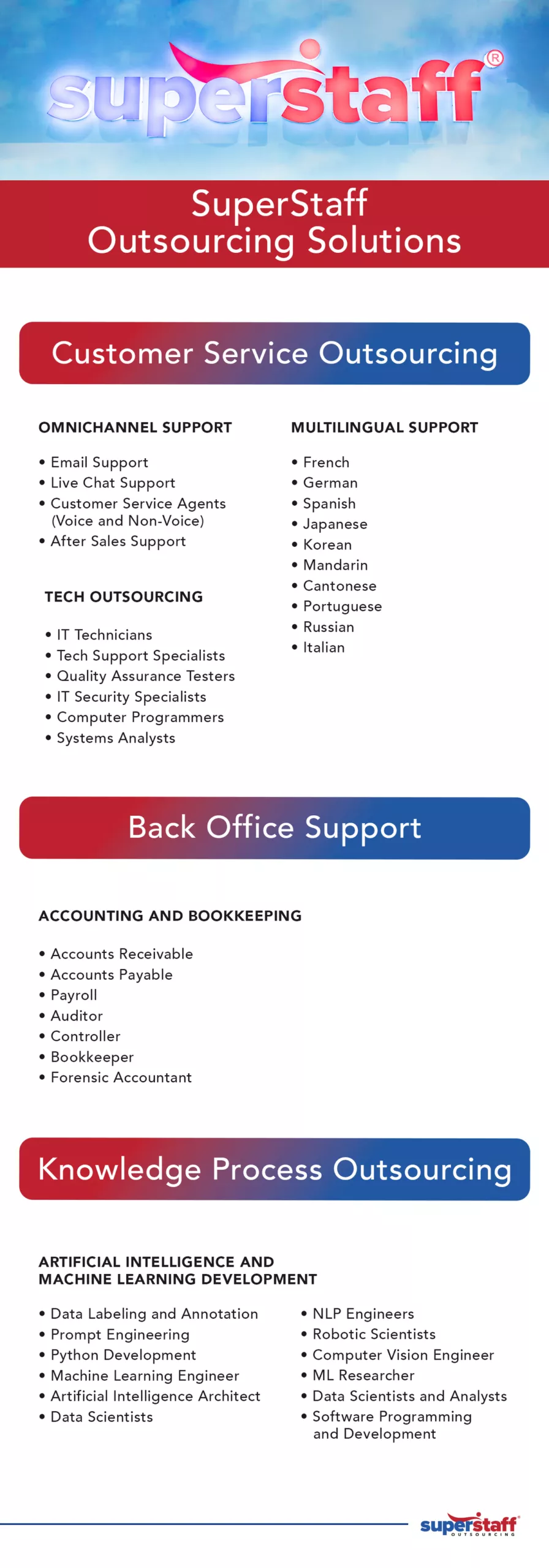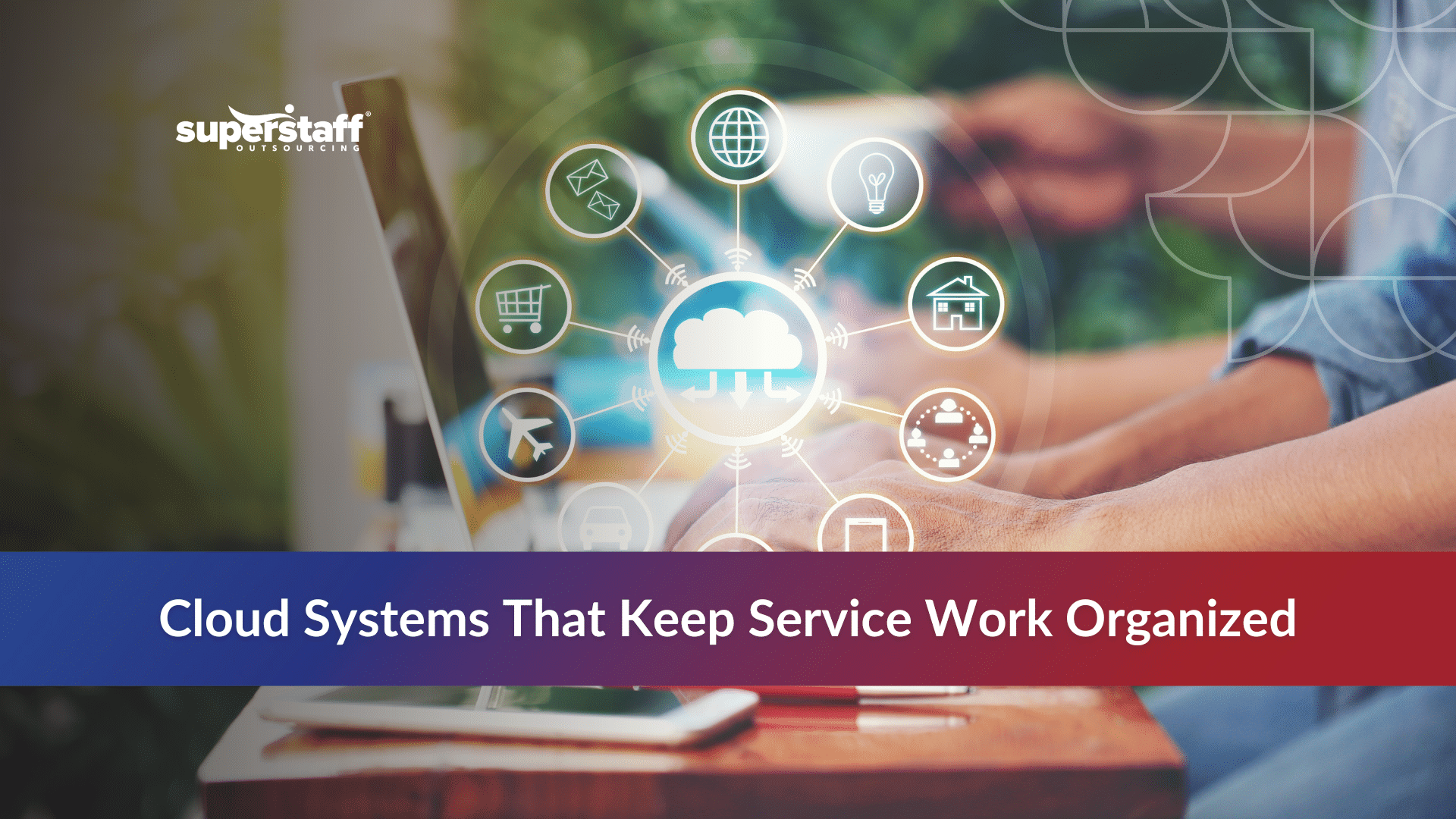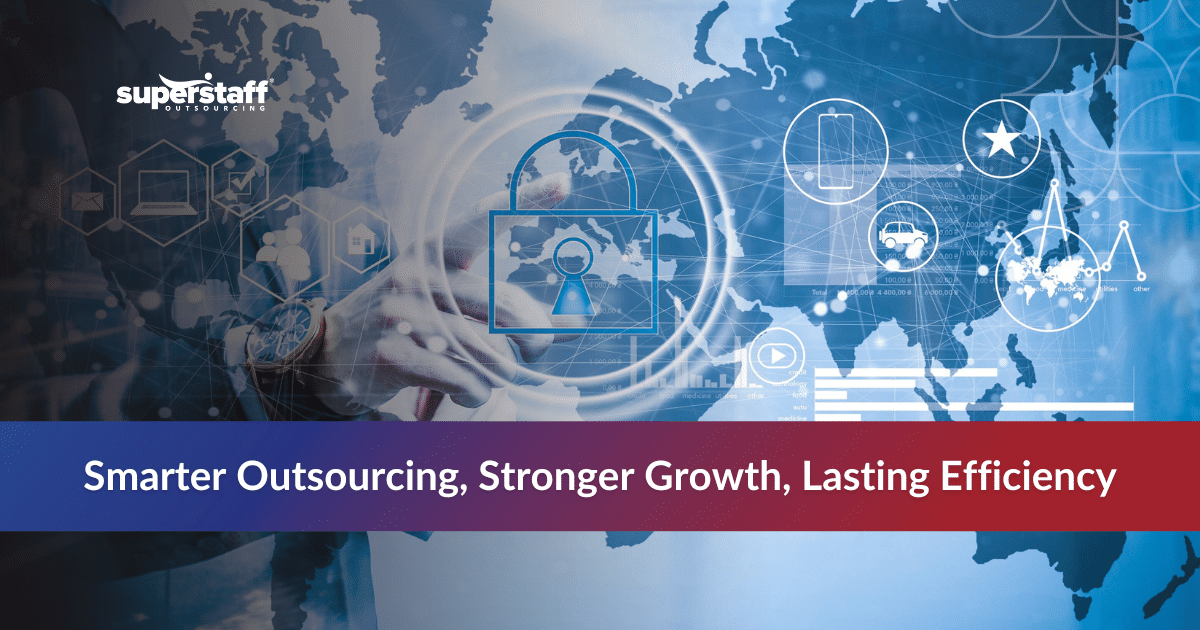
Much like power grid management, outsourcing is also about resource allocation. It’s the art of delegating non-core functions to specialized service providers, freeing up internal resources for what truly matters: core competencies and strategic initiatives.
Channel your energy toward innovation and operational excellence.
Illuminate the path to a future where energy solutions are not just efficient, but also sustainable, agile, and resilient.
The energy sector is a cornerstone of global development and progress, as it provides the power necessary to fuel industries, homes, and technologies. However, despite its promising trajectory (8.6% CAGR), the industry is not immune to business challenges. Industry experts predict supply chain disruptions, rising prices, trade policy uncertainty, and interconnection issues to carry over into 2023, creating strong headwinds in the industry.
Adaptability and resilience is now more crucial than it has ever been. In this regard, outsourcing services emerges as a key strategy for companies to future-proof their operations, while maintaining sharp focus on their core strengths.

Projected Growth in Demand
Despite a slowdown in recent years due to the downturn, the International Energy Agency expects energy demand (growth rate of 3.3%) to pick up in 2024 as the economy bounces back.
Demand spikes will require the expansion of the industry’s capacity to generate electricity. To keep pace, power plants and energy companies – whether conventional or renewable – need to innovate and upgrade their systems to meet the rising consumption levels.
Shift to Renewable Energy
To meet the growing demand, there has been a growing shift towards cleaner and more sustainable energy sources. From 2022 to 2027, renewable power capacity across the globe is expected to grow by 2,400 gigawatts (GW) — equivalent to the entire power capacity of China, a country with one of the biggest populations in the world.
More governments and energy companies are likely to prioritize the development of renewables to reduce emissions and promote environmental sustainability.
Carbon Emissions
The energy sector is one of the largest sources (34.4 billion metric tons) of carbon emissions globally, which caused a rise in sea levels, global temperatures, extreme weather disturbances, and disruptions to ecosystems.
With countries around the world committed to reducing their carbon footprint, the industry will be compelled to speed up the shift to renewables.
Russia-Ukraine Conflict
The Russia-Ukraine conflict heavily impacted the global energy market, with natural gas and coal prices reaching all-time highs in Europe and Asia.
Prioritizing energy security over climate goals, several countries including Germany shelved their coal phase-out plans. Meanwhile, despite global efforts to cut down consumption, coal dependence spiked in two Asian countries with the biggest populations in the world – China and India.
As the world strives for a sustainable future, the energy sector’s ability to navigate these challenges will be pivotal in shaping the course of global development. Strategic outsourcing will undoubtedly remain a driver of innovation, enabling power companies to focus on what they do best while leveraging external expertise and resources.
Top Outsourcing Solutions To Power Your Efficiency
The energy sector is no stranger to outsourcing.
In their pursuit of operational efficiency and agility, energy companies have strategically harnessed the power of outsourcing for critical functions. From Information Technology (IT) to customer service, and even financial management, the sector has experienced a massive transformation with the support of Business Process Outsourcing (BPO).

Customer Service Outsourcing
In an industry where customer satisfaction and loyalty drive success, customer service outsourcing is a strategic move that will help your business stand out from the competition.
Leveraging the vast resources and expertise of BPOs in outsourcing destinations like the Philippines – the Call Center Capital of the World – energy companies can streamline operations, enhance customer experiences, and allocate resources more efficiently for a competitive advantage in a cutthroat market.
Omnichannel Support
Consumer expectations continue to evolve in the digital era, with the demand for seamless and personalized experiences higher than it has ever been. To keep pace, energy companies are increasingly turning to outsourced omnichannel customer support strategies.
Omnichannel support provides customers with a consistent and integrated experience across communication channels, such as phone, email, chat, social media, and even in-person visits. The ultimate goal is to ensure seamlessly convenient customer touch points.
- Email and Live Chat Support
With over half (52%) of customers expecting quick resolution times, email and live channel support emerge as convenient channels they can leverage to avoid long call waiting times.
These asynchronous and synchronous channels each have their distinct strengths when it comes to customer care. For instance, when a customer faces an unexpected power outage, live chat support can provide your clients with quick reassurance. On the flip side, for less urgent but equally important concerns like clarifications on billing statements and service options, email serves as a convenient platform for detailed explanations that they can refer back to whenever necessary.
- Customer Service Agents
From billing questions and service requests to technical issues and account management, customer service agents are frontliners driving loyalty and shaping customer perceptions.
Outsourced customer service agents, in particular, bring a unique edge to their role. With their vast experience handling international clients, they bring a global perspective that enriches interactions, leading to unique solutions that resonate with customers from all walks of life.
- After Sales Support
The relationship between energy companies and their customers goes far beyond the initial transaction; it’s a dynamic continuum. By nurturing their client relationship with after sales support, energy companies don’t just provide services – they elevate the customer experience and pave the way towards client loyalty.
Whether it’s suggesting ways to optimize energy consumption, providing insights into new features, or offering maintenance tips, after-sales support transforms into a treasure trove of knowledge that customers can tap into for continued value.
- 24/7 Chatbot Support
Given the unpredictable nature of energy-related issues, round-the-clock support is needed to ensure that you can effectively address urgent matters that may arise outside of regular business hours – fortunately, tech offers a convenient and cost-efficient solution.
Chatbots enhance customer loyalty while optimizing operational costs by offering real-time assistance across different time zones.
In this fast-paced digital landscape, integrating this technology into your customer service strategies has proven to be an innovative move that sets the stage for a more connected and responsive future.
Technical Support and Help Desk
- IT Technicians and Support Specialists
As the sector generates massive amounts of data from sensors, meters, and other devices, there is an increasing need for professionals to manage complex systems.
Navigating the intricacies of IT management requires a specialized skill set. This is where outsourced technical support steps in, providing a lifeline to energy companies who lack the capacity to do so.
With outsourced IT services, companies gain access to a team of skilled professionals who are well-versed in troubleshooting a wide array of technical issues – from addressing hiccups in data transmission to optimizing data storage systems, these tech experts ensure that your operations run smoothly and without any interruptions.
- Quality Assurance Testers
In a tech-driven industry where the reliability, efficiency, and safety of systems is a matter of life and death, quality assurance (QA) testers play a vital role in safeguarding the quality of various components and applications.
These experts scrutinize the functionality and performance of your entire operation. To protect your systems from potential threats, they evaluate your cybersecurity measures and identify weak points in your system. Furthermore, testers assess user interfaces and experiences to ensure ease of use and accessibility for both customers and operators.
Why do organizations outsource services related to quality assurance?
A partnership with outsourced QA testers isn’t just about mitigating risk; it’s about building a legacy of quality and trust that resonates through every line of code, every system update, and every touch point.
- IT Security Specialists
IT security specialists are the guardians of critical energy systems, ensuring that digital assets remain resilient against cyberthreats.
Highly-trained, outsourced IT professionals monitor your systems for signs of malware, phishing attacks, and breaches. To identify areas that require enhanced protection, they closely scrutinize your extensive energy networks and software applications.
Through IT outsourcing services, you can design and implement security architectures that safeguard energy infrastructure – from firewalls and encryption protocols to intrusion detection systems.
- Computer Programmers and Systems Analysts
Computer programmers and systems analysts are instrumental in shaping the future of the energy sector. Their innovations improve operational efficiency and enhance customer experiences, paving the way for the seamless integration of renewable energy sources.
Computer programmers create the software that manages energy grids, monitors equipment, and supports customer service applications. Meanwhile, systems analysts probe existing energy networks, identifying pain points and implementing solutions that enhance efficiency and reliability.
The skills and expertise of these professionals become increasingly essential in building a more sustainable, efficient, and technologically-advanced sector. Outsourcing these roles isn’t just a strategy for optimization; it’s a commitment to accelerated innovation.
Outsourced Accounting Services
Amid a growing shortage of accountants in the U.S., outsourced accounting services offer energy companies a streamlined and cost-effective approach to managing finances while ensuring accuracy and compliance.
BPOs provide specialized expertise, scalable solutions, and advanced technologies that drive financial excellence. By partnering with accounting experts in the outsourcing industry, the energy sector can fuel sustainable financial growth, ultimately powering a successful and prosperous future.
- Accounts Receivable and Accounts Payable
Effectively managing accounts payable and receivable is essential for the energy sector to maintain financial stability.
Energy companies rely on a vast network of vendors for equipment, supplies, and services to keep their operations running smoothly. With timely payments as a currency of trust, managing accounts payable allows energy companies to solidify vendor partnerships.
On the other hand, their financial operations wouldn’t be complete without payments. These companies cater to a multitude of customers, each with their own unique transactions. The role of accounts receivable management is to meticulously track payments, ensuring robust profit margins.
Outsourcing these functions ensures a healthy cash flow as well as strong relationships with suppliers and customers.
- Payroll Services
Accurate and timely payments to employees and contractors not only maintains a motivated workforce, it also upholds the financial integrity of energy companies. Fortunately, outsourcing payroll services can guarantee the success of this endeavor.
With the energy sector subject to various regulations, tax codes, and labor laws, BPOs ensure strict adherence for consistent and reliable payroll services that enhance employee morale and loyalty.
- Auditors and Controllers
Maintaining financial transparency is vital in any business. But due to market volatility, it takes on even greater significance in the energy sector
The rise and fall of power prices aren’t just figures on a spreadsheet; they are reflections of a complex intersection of supply, demand, geopolitical shifts, and technological advancements. With so many variables at play, the role of auditors goes beyond numbers, encompassing risk management, compliance, and operational efficiency.
By diligently auditing, controlling, and safeguarding financial operations, service providers contribute to the long-term sustainability and success of energy companies.
- Bookkeepers and Forensic Accountants
In this intricate financial landscape that’s driven by complex transactions and regulatory demands, two specialized accounting roles play essential roles in maintaining accurate records, ensuring compliance, and investigating discrepancies.
Bookkeepers are responsible for maintaining accurate ledgers and ensuring the integrity of reports. Meanwhile, forensic accountants specialize in uncovering discrepancies, fraud, and irregularities. Both roles contribute to financial analysis, providing insights into revenue, expenses, and trends that inform strategic decision-making.
Outsourced bookkeepers and forensic accountants are indispensable pillars of integrity in the energy sector. By ensuring that transactions are accurately and transparently reported, these professionals uphold the financial health and credibility of energy companies.
Knowledge Process Outsourcing
Artificial Intelligence (AI) is poised to revolutionize the energy sector, offering unprecedented opportunities for efficiency, sustainability, and customer engagement. While speed-to-market may vary depending on regulatory environments, AI’s effects are expected to be felt across the board, from human resource and customer billing management to power distribution and renewable energy integration.
To keep pace with the revolution, AI and Machine Learning (ML) outsourcing services to a leading tech outsourcing destination such as Colombia has become a strategic move for businesses across the globe.
- AI and Machine Learning Development
Artificial intelligence and machine learning are reshaping energy operations, enabling better decision-making, optimizing resource management, and fostering more sustainable practices.
For one thing, AI and ML models help predict energy demand, consumption patterns, and equipment failures, leading to better resource planning and reduced downtime. AI algorithms also analyze market trends and historical data, optimizing energy trading strategies for better financial outcomes. To name just a few, Shell, Chevron, and Saudi Aramco are among the industry titans leading the charge in the use of AI in their operations.
As AI and ML unlock new frontiers, energy companies stand at the crossroads of innovation, ready to usher in a new era of excellence through outsourcing.
- Data Labeling and Annotation
Data is the foundation upon which advanced analytics and machine learning thrive. Accurate, well-labeled data enables the sector to optimize operations, improve efficiency, and drive innovation.
Labeling and annotation – the process of categorizing, tagging, and enhancing raw data – makes data comprehensible for AI and analytics systems. While it is crucial for training machine learning models, the intricacies of the task can become quite daunting, particularly in this data-driven sector.
The answer lies in outsourcing data entry. By delegating data entry responsibilities to specialized experts, energy companies can guarantee the precision and meticulous organization of expansive datasets.
- Software Programming and Development
In an era defined by tech advancements, software paves the way to optimize operations, enhance efficiency, and drive innovation for energy companies.
Software tools and applications analyze vast amounts of data, providing actionable insights into energy consumption patterns, grid behavior, and asset performance. Software-driven smart grids also enhance energy distribution and minimize outages.
Embracing these technologies through outsourcing software development empowers energy companies to navigate evolving challenges, drive efficiency, and contribute to a cleaner and more efficient energy future.
- NLP and Computer Vision Engineers
Through innovations such as Natural Language Processing (NLP) and computer vision technology, computers have evolved to communicate and perceive the world as humans do.
A simple way to look at it is that speech recognition and machine learning has taught AI to mimic the natural way people converse – this is what NLP is all about. It is the process by which chatbots and voice-activated devices are able to communicate seamlessly with your customers. Meanwhile, computer vision technology replicates human vision to make sense of visual data.
This is the very technology that powers self-driving cars, allowing them to safely navigate traffic and roadblocks. Through image processing and motion analysis, AI is able to detect and recognize objects. Imagine the potential this technology holds in the sector. On a micro-level, energy companies can deploy robots to repair power line disruptions, but on a much larger scale it can conduct complex functions such as remote grid monitoring, ensuring safety compliance and optimizing asset management.
NLP engineers and Computer Vision engineers are catalysts for transforming the energy sector into a data-driven and customer-centric industry. Outsourcing these experts optimizes operations, enhances safety, and fuels innovation.
- Data Scientists and Analysts
Data scientists, one of the fastest-growing occupations (projected growth of 36% from 2021 to 2031) in the U.S., play a critical role in the energy sector.
For one thing, these experts use data to predict equipment failures, enabling efficient maintenance scheduling. Analysts also uncover insights into consumer behavior, supporting demand-side management strategies. Additionally, they analyze market trends to guide energy trading decisions and pricing strategies. Their deep expertise in transforming big data into actionable insights empowers energy companies to optimize operations, enhance customer engagement, and contribute to a greener future.
As predictive analytics becomes increasingly integral in the energy landscape, data science outsourcing emerges as a strategy for better decision-making.
Steps in Starting Your Outsourcing Journey
Whether it’s enhancing customer experience, strengthening tech capabilities, fueling financial growth, or driving innovation, outsourcing has become a bedrock of modern business success.
How can energy companies ensure their outsourcing success?
Let’s take a look at this simplified outsourcing guide.

Launching the Partnership
Assessing Your Needs
The journey begins with a clear vision. Outline your goals, pinpointing the roles you intend to outsource.
This stage demands an in-depth needs assessment. By clearly defining your objectives and skill requirements, you’re setting the stage for a partnership that aligns with your strategic direction.
Shortlisting Vendors
Finding the right outsourcing partner is absolutely critical. Once you’ve found vendors with a proven track record, assess their capabilities and cultural compatibility with your business – then proceed to narrow down your list using the following documents:
- Request for Information (RFI)
An RFI allows you to gather deep insights about their capabilities, approach, and strategies. This doesn’t necessarily have to be long, you can just ask for the information you need in a straightforward manner.
- Request for Quote (RFQ)
With a clearer understanding of your potential partners’ capabilities, it’s time to request a quote. The RFQ provides you with a cost estimate for the outsourcing services, including factors like hourly rates and volume-based pricing.
- Request for Proposal (RFP)
In this crucial step, you send out a comprehensive document outlining your specific requirements, expectations, and evaluation criteria to compare proposals objectively and make an informed decision.
Negotiating Terms
With these documents in hand, you are now ready to proceed with negotiations.
Coordinate with the vendors whose proposals align most closely with your needs. Finalize terms and ensure that all expectations are clearly outlined to avoid misunderstandings down the line.
Plotting Your Timeline
After the ink has dried on the agreement, a new phase begins – the journey from collaboration to seamless operations. A well-structured partnership launch timeline outlines the progression from recruitment to the nesting period.
Here’s a quick glimpse at a standard timeline.
- Agent Recruitment and Hiring
Once the partnership is formalized, the first step is to assemble your dream team. This process involves sourcing and hiring individuals with the right skills and cultural fit to ensure that they are equipped to deliver your brand of exceptional service.
- Agent Training and Onboarding
Once you’ve handpicked your agents, the next phase is training and onboarding – a critical investment in your agents’ success. This stage includes comprehensive training on processes, systems, product knowledge, and customer interactions.
As another critical part of the process, agents will also be introduced to your work culture and brand values. Through immersive training and orientation, they will be equipped with the tools to provide top-notch service.
- Going Live
The transition from training to actual operations marks a pivotal moment in your outsourcing journey. Going live involves transitioning agents from the training environment to handling real customer interactions. This phase allows agents to apply their training in real-time situations, gain confidence, and adapt to the dynamic nature of customer interactions.
- Nesting Period
Immediately after the launch, comes the nesting period – during which, agents handle touch points under the watchful eye of their supervisors. It’s a period of adjustment and fine-tuning, where your outsourced teams build on their initial training and enhance their skills.
Building a Sample Team Structure
A well-structured team is the foundation of any successful outsourcing endeavor. Depending on their size and specific needs, this may be different for every business. However, a standard team structure for billing and hourly model outsourcing typically looks like this:
- Country Manager
At the apex of the structure stands the Country Manager – a visionary leader overseeing all operations within the country. From crafting strategic business development initiatives to aligning the team with corporate objectives, their role is pivotal in steering the outsourcing journey towards success.
- Director of Operations
Under the guidance of the Country Manager, the Director of Operations takes charge of the daily operations, monitoring performance metrics, and addressing challenges promptly.
- Program Manager
The Program Manager is a master strategist in charge of developing, implementing, and monitoring programs. They ensure that your vision is successfully translated into action.
- Team Leader
At the helm of each team, the Team Leader supervises customer service or technical support agents – ensuring that operations are smooth, targets are met, and the team is well-supported.
- Customer Service or Technical Support Agents
Sitting at the very heart of the operation, agents attend to customer inquiries across multiple channels. Whether addressing billing inquiries or providing technical support, these frontliners shape customer experiences and build brand loyalty.
Managing the Outsourced Team
From fostering communication to maintaining quality, here’s how you can navigate the outsourcing process with ease.
Communication
Communication is the key to successful outsourcing.
Establish clear and consistent channels of communication – both in-person and online – between your in-house team and the outsourcing partner to discuss progress, address pain points, and align strategies.
Performance Metrics
To ensure that your outsourcing initiative stays on course, define key performance indicators (KPIs) that will act as your guideposts to success. Monitoring these benchmarks will help you gain insights into the effectiveness of the outsourcing partnership.
Quality Assurance
Quality isn’t a one-time achievement; it’s a continuous journey.
Implement a robust quality assurance framework to ensure that you meet the highest standards. By upholding quality as a priority, you forge a path to excellence that resonates with your customers and stakeholders.
Feedback Loop
Create a safe space for your company and the outsourcing team to share insights, suggestions, and concerns.
Collecting feedback from all angles helps identify weaknesses so you can implement necessary adjustments and fuel a cycle of progress that propels the partnership forward.
Read More: Comprehensive Guide to Post-Pandemic Customer Service Outsourcing to the Philippines
Unlocking the Power of Outsourcing Services To Transform the Energy Sector
Much like power grid management, outsourcing is also about resource allocation. It’s the art of delegating non-core functions to specialized service providers, freeing up internal resources for what truly matters: core competencies and strategic initiatives.
With SuperStaff as your partner, you can channel your energy toward innovation and operational excellence. Together, we illuminate the path to a future where energy solutions are not just efficient, but also sustainable, agile, and resilient!






